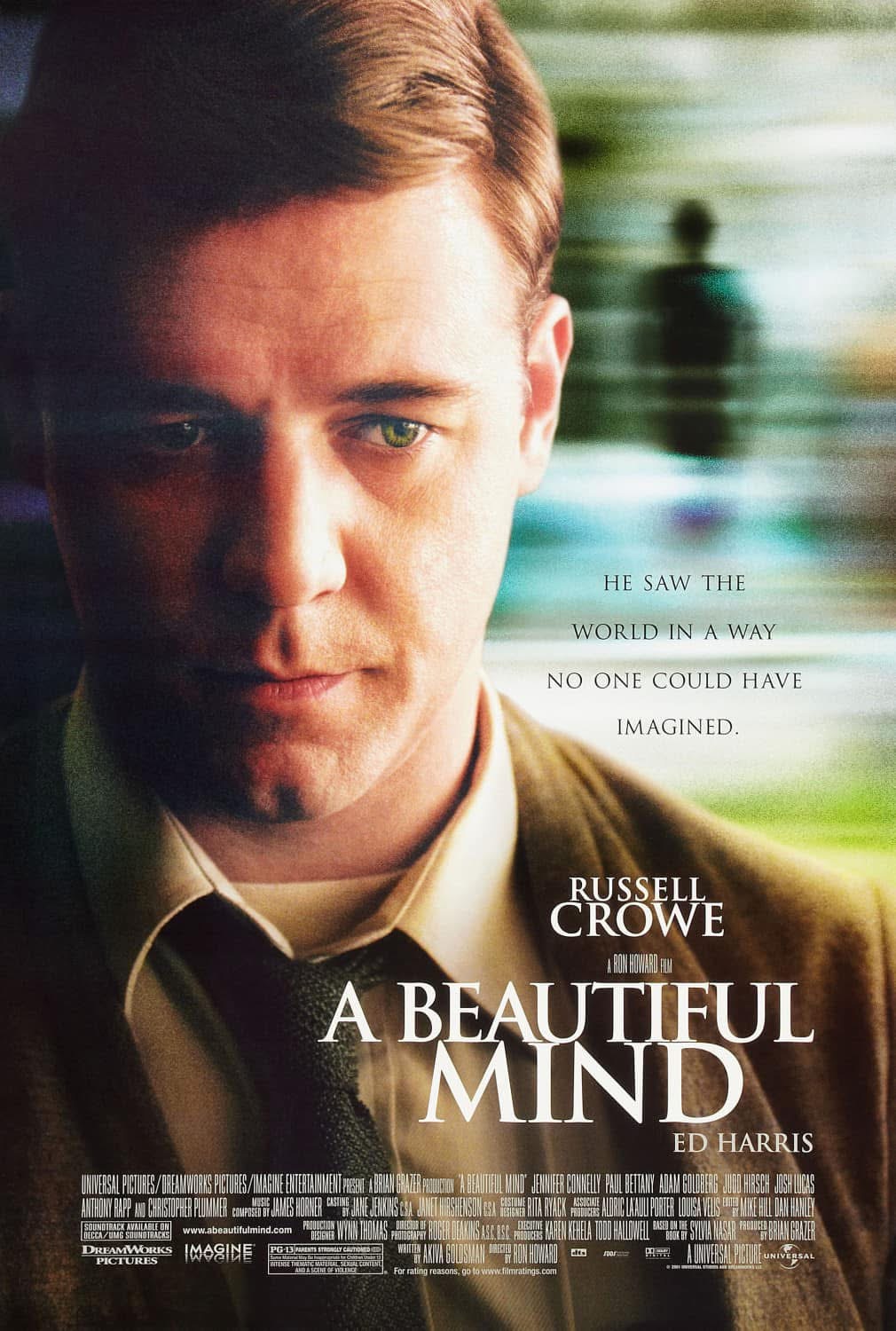A Beautiful Mind (2001)

The story follows John Nash (Russell Crowe), a brilliant but socially awkward mathematician at Princeton University in the 1940s. Nash’s mind is consumed by his desire to uncover a groundbreaking idea, which he achieves in his revolutionary concept of “governing dynamics.” This discovery propels him into academic fame.
As Nash’s career advances, he is drawn into what he believes is top-secret government code-breaking work under the mysterious William Parcher (Ed Harris). However, his life takes a harrowing turn when it’s revealed that Nash’s experiences are delusions caused by paranoid schizophrenia.
The film shifts its focus to Nash’s battle with his mental illness, the toll it takes on his relationships—particularly with his wife, Alicia (Jennifer Connelly)—and his journey to regain control of his life. Through love, resilience, and determination, Nash learns to coexist with his condition, culminating in his recognition by the Nobel Committee later in life.
Suggested videos for you:
Themes and Emotional Depth
At its heart, A Beautiful Mind is a story about the triumph of the human spirit. It explores the complex interplay between brilliance and vulnerability, showing how Nash’s extraordinary intellect is both his greatest asset and his greatest challenge. The film also delves into themes of love and sacrifice, with Alicia’s unwavering support serving as a cornerstone of Nash’s eventual stability.
The portrayal of mental illness is both harrowing and empathetic. While dramatized for narrative purposes, the film effectively conveys the confusion, fear, and isolation that schizophrenia can bring, as well as the stigma associated with it.
Performances
Russell Crowe delivers a tour-de-force performance as John Nash, capturing both the character’s intellectual brilliance and his emotional fragility. Crowe’s nuanced portrayal allows the audience to sympathize deeply with Nash, as he conveys the mathematician’s struggles with paranoia and delusions while maintaining his dignity and humanity.
Jennifer Connelly is equally compelling as Alicia Nash, portraying her character with strength, compassion, and resilience. Her performance earned her the Academy Award for Best Supporting Actress, and rightfully so—her role as Nash’s anchor through his darkest moments is one of the film’s emotional highlights.
Ed Harris and Paul Bettany deliver strong supporting performances, adding layers to Nash’s delusions and relationships.
Direction and Screenplay
Ron Howard’s direction is both sensitive and gripping, striking a careful balance between the film’s intellectual themes and its emotional core. The screenplay by Akiva Goldsman adapts Sylvia Nasar’s biography with a focus on drama and accessibility, emphasizing Nash’s personal journey over his academic achievements.
The film cleverly integrates Nash’s hallucinations into the narrative, initially presenting them as real events and slowly unraveling their illusory nature. This approach immerses the audience in Nash’s perspective, making the eventual revelation of his condition all the more impactful.
Cinematography and Score
The cinematography by Roger Deakins enhances the film’s tone, with stark contrasts between the idyllic university settings and the darker, more claustrophobic moments of Nash’s struggles. Subtle visual cues, like recurring patterns and reflections, mirror Nash’s mathematical mind and hint at his unraveling perception of reality.
James Horner’s score is another standout aspect of the film. The music, with its haunting melodies and ethereal tones, underscores Nash’s internal conflicts and moments of triumph, adding emotional resonance to the narrative.
Criticisms
Despite its many strengths, A Beautiful Mind has faced criticism for its historical inaccuracies and dramatization. The film simplifies Nash’s mathematical achievements and glosses over certain aspects of his personal life, such as his struggles with relationships outside his marriage. Additionally, some critics argue that the film romanticizes Nash’s journey, focusing more on his triumphs than the full scope of his challenges.
However, these choices can be seen as necessary for crafting a compelling and accessible narrative, rather than a strict biographical account.
Legacy and Impact
A Beautiful Mind was both a critical and commercial success, grossing over $300 million worldwide and winning four Academy Awards, including Best Picture, Best Director, Best Adapted Screenplay, and Best Supporting Actress. Its portrayal of mental illness has sparked conversations about schizophrenia, helping to raise awareness and reduce stigma.
The film’s message—that even the most daunting challenges can be overcome with love, resilience, and determination—resonates universally, making it a timeless piece of cinema.
Conclusion
A Beautiful Mind is a powerful and emotionally resonant film that celebrates the triumph of the human spirit. With stellar performances, masterful direction, and a compelling narrative, it tells a deeply personal story of struggle and redemption. While it takes creative liberties, its emotional impact and universal themes make it a standout in the genre of biographical dramas. Whether you’re drawn to its exploration of mental illness, its celebration of genius, or its heartfelt portrayal of love and perseverance, A Beautiful Mind is an unforgettable cinematic experience.










